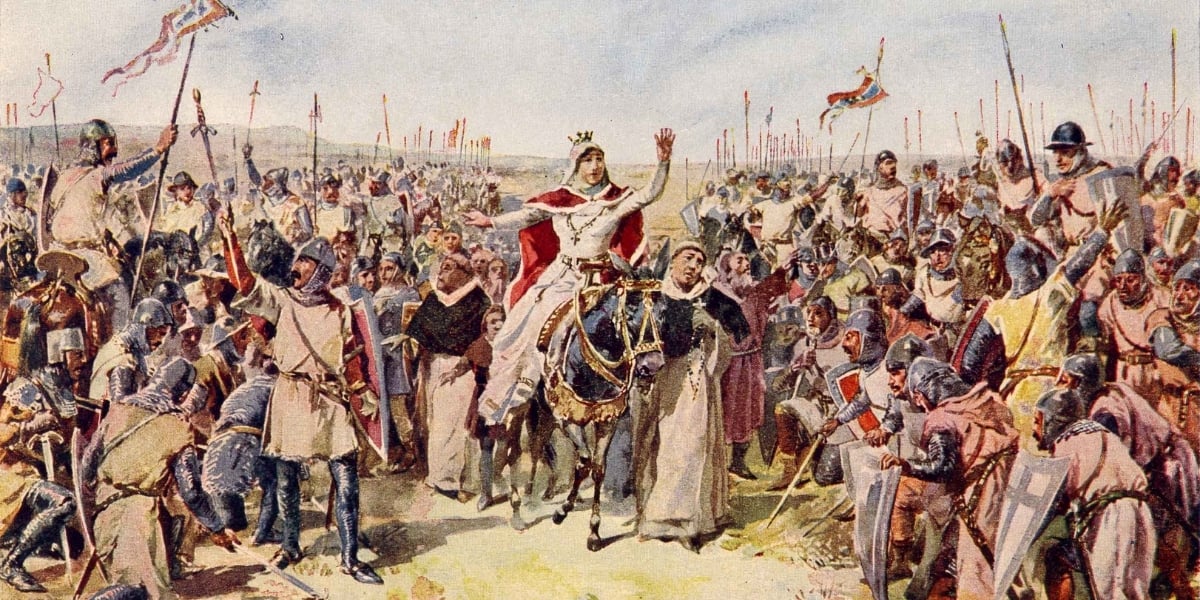Pope Leo XIV – Inaugural Mass Homily
Elected on May 8, 2025, as the 267th successor of St. Peter, Pope Leo XIV’...

The importance of forgiving those who sin against us is so central to the gospel that it was embedded in the short prayer taught by the Lord Jesus. Yet regrettably we see throughout Christian history that even members of Christian families have so neglected this command that conflicts have come to blows. Such occurred regularly in medieval Europe between rival claimants to the throne of various states. St. Elizabeth of Portugal would not stand by and watch such conflict. When her son and step-son squared off against each other on the battlefield, St. Elizabeth rode her mule between the two armies and prevented the hostilities from erupting. And so, though she was a model wife, queen, servant of the poor, and third order Franciscan, she is most well-known and honored as a peace-maker. Hence, on her feastday of July 4 (in the USA, July 5) the following excerpt on the beatitudes by St. Peter Chrysologus is read in the Church’s Office of Readings in her honor.
Blessed are the peacemakers, the evangelist said, dearest brethren, for they shall be called the sons of God. Truly Christian virtues grow in a man who enjoys the unchangeable possession of Christian peace, nor does one come to the title of son of God except through that of peacemaker.
Peace, dearest brethren, rescues man from servitude, provides him with the name of a free man, changes his identity before God together with his condition, from a servant to a son, and from a slave to a free man. Peace among brethren is the will of God, the joy of Christ, the completion of holiness, the rule of justice, the teacher of truth, the guardian of morals and a praiseworthy discipline in every regard. Peace lends strength to our prayers; it is the way our petitions can reach God easily and be credited; it is the plentitude which fulfills our desires. Peace is the mother of love, the bond of concord and the manifest sigh of a pure soul, one which seeks to please God, which seeks to be fulfilled and has its desire rewarded. Peace must be preserved according to the Lord’s precepts, as Christ said: I leave you peace, my peace I give you, that is, as I left you in peace, in peace shall I find you. As Christ left the world, he wished to leave the gift he wanted to find when he returned.
We have a commandment from heaven to retain his gift; his one word is: “I shall find what I left.” God’s is the planting of peace in the root, but the uprooting is from the enemy; for, just as brotherly love comes from God, so hatred comes from the devil; therefore, we must condemn our hatred of men, for it is written: He who hates his brother is a murderer.
Now you see, dearest brethren, why we should love peace and cultivate harmony: because they beget and nurture love. But you know also from the apostle John that, Love comes from God, and that whoever is not with God does not possess love.
Let us therefore, my brethren, keep the commandments, which are life for us; let us carry on together the obligations of our brotherhood in profound peace; let us bind one another with the ties of salvific charity in this mutual love which covers a multitude of sins. Love ought to be embraced with the grasp of all our desires, since the goods it provides amount to as many rewards. We must keep peace before all other virtues, since God is always in peace.
Love peace, and all the world will be tranquil and quiet. By doing so you store up rewards for me, and joy for yourselves, that the Church of God may be founded on the bond of peace and may cling to perfect observance in Christ.
This reading on peacemakers is by St. Peter Chrysologus and is an excerpt from his sermon from the De pace: PL 52, 347-348. It is used in the Roman Office of Readings for the liturgical celebration of St. Elizabeth of Portugal, July 5 (United States).
Featured image: Saint Elizabeth of Aragon in the Alvalade Battlefield, by Roque Gamiero, 1917. Public domain.
No Comments